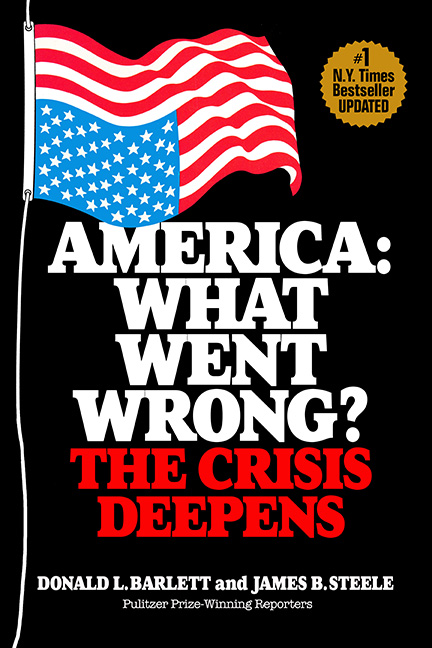Books

America: What Went Wrong? The Crisis Deepens
Foreword
America’s middle class is in crisis, and it is a crisis that has been building for 50 years. This dispiriting American trajectory toward severe inequality—economically ravaging half the U.S. population, middle class and working class alike—requires a fresh and profound understanding if we are to change a devastating course.
Fortunately, this new edition of America: What Went Wrong?—the seminal work on the origins of inequality in America—is coming just at the time that our country seems to be waking up to the slow-motion disaster that gross income and wealth disparities have wrought. With this new, expanded book, subtitled The Crisis Deepens, and a growing American understanding of the issue, it is possible that we can fashion a whole new series of approaches to make sure resources and opportunity are available to all in America.
Beginning in the 1970s, we have seen the needs and interests of the American working and middle classes relentlessly savaged for the past half-century. This has involved politicians of all stripes and businesses at every level of the U.S. economy. Many of us who are doing OK have lamented the unfairness of our system, but we have done little politically to force change. Now we have a society in which opioid addiction, death by drug overdose and suicide have become epidemic.
Inequality of wealth and income is more severe than at any time in the 20th century, matching even the famously unfair system of the Gilded Age 120 years ago. Some 58 percent of American families have no savings, no cushion and are at the whim and mercy of any fateful mishap—a health crisis, a fire, a car accident, the loss of a job. Working-class and middle-class despair is rampant.
Three decades ago, the great American investigative reporters Donald L. Barlett and James B. Steele chronicled the systematic unraveling of the economic security of most of working America in their famous book, America: What Went Wrong? It stayed at No. 1 on The New York Times Bestseller List for weeks and had a profound impact on the political campaigns of the 1990s.
That account was originally published as a series of articles in The Philadelphia Inquirer when I was serving as editor of the paper. It engendered the most astonishing public response I have ever seen to a series of articles: Thousands of readers lined up on Broad Street, snaking down toward City Hall from the Inquirer Building, all anxious to get a reprint. We received more than 20,000 letters and phone calls from grateful readers telling us how glad they were that we had told their story. It was this outpouring that led Barlett, Steele and me to fashion a strategy to expand the series into the book.
It was later recognized by New York University as one of the 100 most important works of journalism of the 20th century, and it remained in print and in circulation for years. But the great shock for us at the time was that because the book was so far ahead of the rest of the country, it didn’t change things. Some people dismissed it as extreme, and others doubted things were as bad as the articles had depicted.
But, today, citizens at every level of American society and every political persuasion recognize the brutal impact of inequality. No one doubts the serious social situation we have allowed our democracy to devolve to: over half the country disaffected, unwilling to believe in the fairness or justice of our system; millions so angered by what they rightly feel is a system artfully stacked against the interest of the many and in the interest of the few that they indulge in populist rage that threatens the stability of society.
This is so clearly a time that can benefit from the message of— and the spectacular factual weight of—America: What Went Wrong? The Crisis Deepens. No other work has so clearly, so powerfully documented how we got into this mess—and what we need to do about it. Fortunately for all of us, Barlett and Steele are bringing forth an edition that has been carefully updated, with fresh reporting and writing on the current American predicament.
This book will certainly stand the test of time. But it is not an historical account from a short period of time long ago. It is as rele- vant today—perhaps more relevant—than at any time in our history. It is essential that Americans understand that the fix for our problem is not just an election. It isn’t just Donald Trump. The trouble with so many of us is that we seem to believe that if we can just get Trump out of the White House that everything will be fine. It won’t. Certainly, electing a competent leader is the necessary first step. The elections matter, of course; but still we will have massive obstacles to overcome. And only if the public has a strong understanding of where we are and how it went wrong can we hope to take the meaningful actions that can repair our system.
This new edition offers that understanding. We must heed its message now.
— Maxwell King
Former editor of The Philadelphia Inquirer and President of the Pittsburgh Foundation









